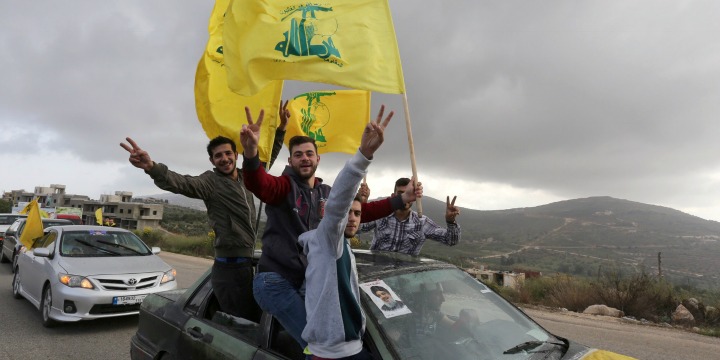Hezbollah May Be Down, but It’s Not Out
 by Yoav Limor / JNS.org
by Yoav Limor / JNS.org
JNS.org – With all the astonishment at the massive Hezbollah terror tunnel project revealed this week by the IDF, the tunnels themselves were just a tool that the organization intended to use to implement its larger plan to attack the Galilee.
It was a grandiose plan that entailed sending hundreds of fighters into Israeli territory, all at once, to occupy territory and commit murders and abductions, creating an unprecedented effect that would echo throughout the Middle East for years.
Fighters from Hezbollah’s elite Radwan Unit (named after Imad Mughniyeh, the Hezbollah commander killed in Damascus in 2008, reportedly by Israel) were supposed to carry out the incursion. The unit, which was established for the purpose of executing covert actions against Israel, has been fighting in the Syrian war for the past several years, gaining extensive operational experience, but suffering heavy casualties.
At the end of the Syrian war, most of the Radwan fighters returned to Lebanon, and in the past few months, they have been moving to the south of the country. We cannot assume this means that Hezbollah is looking for a war with Israel. The opposite may be true: the organization is still licking its wounds, as well as suffering from the exposure and destruction of its tunnels, and is in financial trouble due to the economic situation in Iran, which led Tehran to slash funding for Hezbollah. It certainly won’t rush into another and much more difficult war.
Nevertheless, that the unit — with its special capabilities — continues to dig in southern Lebanon shows that Hezbollah has not given up its basic intentions or its intensive preparations for its next war with Israel. The exposure of its tunnels certainly requires Hezbollah to change its operational plans, but the basic idea remains the same: a ground operation heading south, toward the Galilee, with the purpose of wreaking death and destruction.
Radwan is supposed to spearhead the action, which will be accompanied by a storm of rockets, mortars, anti-tank missiles, drones, and plenty of other types of attack. All of these comprise a real challenge for Israel, one that is growing as Radwan continues to move south. Though for Israel there are also certain advantages: a unit of that size needs a train of logistic and command support, which provide plenty of targets.
After the success of the IDF’s “Operation Northern Shield,” the purpose of which was to expose and neutralize Hezbollah’s cross-border attack tunnels, this will be the Northern Command’s main challenge for the foreseeable future — to expose any new plans Hezbollah comes up with, and prepare a double response, one that will deter Hezbollah and root out its desire to fight, or should that fail, guarantee victory for the IDF.
Still, make no mistake — despite Israel’s victories, Hezbollah is a serious, devious enemy, and the IDF’s biggest challenge right now. The recent blows to its operations will not cause it to take its eyes off its goal, which is to attack Israel. To do so, Hezbollah will stop at nothing — above or below ground.
Yoav Limor is a veteran Israeli journalist and columnist for Israel Hayom, where a version of this article first appeared.
 US Stops UN From Recognizing a Palestinian State Through Membership
US Stops UN From Recognizing a Palestinian State Through Membership Jordan Reaffirms Commitment to Peace With Israel After Iran Attack, Says Ending Treaty Would Hurt Palestinians
Jordan Reaffirms Commitment to Peace With Israel After Iran Attack, Says Ending Treaty Would Hurt Palestinians ‘Crisis at Columbia’: Elite University Spirals Into Chaos Against Backdrop of School President’s DC Testimony
‘Crisis at Columbia’: Elite University Spirals Into Chaos Against Backdrop of School President’s DC Testimony ‘A Time for Vigilance’: FBI Director Says Agency on Alert for Threats Against Jewish Community During Passover
‘A Time for Vigilance’: FBI Director Says Agency on Alert for Threats Against Jewish Community During Passover New Haggadah Released for Israeli Soldiers in Gaza Ahead of Passover
New Haggadah Released for Israeli Soldiers in Gaza Ahead of Passover ADL Data Reveals Alarming Campus Antisemitism, Despite Strong Jewish Life
ADL Data Reveals Alarming Campus Antisemitism, Despite Strong Jewish Life New Hospital Approved for Construction in Southern Israel Amid Gaza War
New Hospital Approved for Construction in Southern Israel Amid Gaza War UN Security Council to Vote Thursday on Palestinian UN Membership
UN Security Council to Vote Thursday on Palestinian UN Membership New Play Opening in NY Recounts Verbatim Testimonies From Oct. 7 Survivors, Families of Victims
New Play Opening in NY Recounts Verbatim Testimonies From Oct. 7 Survivors, Families of Victims




 Anti-Israel Activists Protest Outside US, Israeli Pavilions at Venice Biennale, Accuse Jewish State of Genocide
Anti-Israel Activists Protest Outside US, Israeli Pavilions at Venice Biennale, Accuse Jewish State of Genocide ‘Crisis at Columbia’: Elite University Spirals Into Chaos Against Backdrop of School President’s DC Testimony
‘Crisis at Columbia’: Elite University Spirals Into Chaos Against Backdrop of School President’s DC Testimony Gaza Terrorist Spokesperson Reveals How Media Falls for Terror Group’s Lies
Gaza Terrorist Spokesperson Reveals How Media Falls for Terror Group’s Lies Jordan Reaffirms Commitment to Peace With Israel After Iran Attack, Says Ending Treaty Would Hurt Palestinians
Jordan Reaffirms Commitment to Peace With Israel After Iran Attack, Says Ending Treaty Would Hurt Palestinians ‘Washington Post’ Platforms Superficial ‘As a Jew’ Op-Ed on Israel & Gaza
‘Washington Post’ Platforms Superficial ‘As a Jew’ Op-Ed on Israel & Gaza